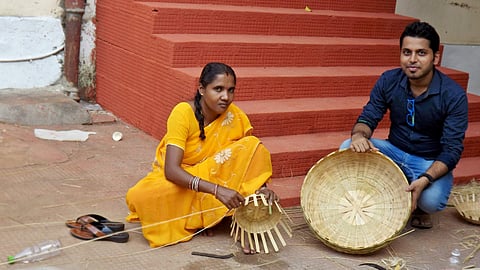

They wade through rivers, walk through dense jungles and cross hills to reach inaccessible and untouched tribal pockets. And why do they do all this? Because Team Vat Vrikshya founded by 28-year-old Vikash Das, who quit his lucrative job to enable tribal women to earn a sustainable livelihood, is determined to make the lives of those living in the tribal belts of Odisha, West Bengal, and Jharkhand better.
The tribal people are given the initial capital and linkages to women’s social groups, NGOs and financial institutions to help them launch their own arts and crafts enterprises. We caught up with Vikash who describes the inception of the venture, its growth model and everything in between. Excerpts:
Were you involved in social work during your college or IBM days?
Yes, of course. When you come across the ugliness of society, you feel like doing your bit by joining an NGO or charity organisation. I was actively involved with IBM’s CSR wing. However, I didn’t like doing voluntary work because I felt that we hadn’t done any good to the marginalised communities by giving them a few pennies. I believe that sustainable business models with considerable impact are much more effective than the conventional charity model approach.
So, can someone make a successful career out of this sustainable social entrepreneurship?
Social entrepreneurship is a process combining the passion of a social mission with an image of business-like discipline. Such enterprises have social impact as their primary objective and profit-making as secondary. Their services and products mainly benefit people at the bottom of the pyramid. On the bright side, social entrepreneurs bring large-scale transformation, replacing short-term charity with sustainable solutions.
But any development needs funds. How did you manage that?
Yes, they needs funds, but not necessarily in the form of grants or donations. When I started my social venture I didn’t have a pocket full of money, but what I had was a mind full of ideas and the willingness to be the change. We are profitable and hence sustainable. I believe in today’s world, if you have ideas, money will follow.
What were the initial challenges apart from funding?
To begin with, my family and friends were upset with the fact that I was leaving my high-paying job and settling down in a remote village. But when they figured what our business model was and how effective it was, they gave in. On the other end, since the tribals were always in fear of being exploited by outsiders, the toughest thing for us was to convince them to become a part of this idea.
Where do you see this project in the next five years?
Our plan is to maximise our product distribution through digital commerce expansion to bring Indian tribal handicrafts to national markets. We aspire to change the lives of 50,000 tribal families by 2030 by empowering women artisans. We will provide training to 35,000 rural women to start their own business.
Which are the moments that you cherish the most?
When I see smiling faces come to me and say, “It’s because of the ripple effect of your work that we are living a life of dignity.” I feel that’s the most cherishing moment for me. Sukirna Majhi, a 65-year-old widow was once not allowed inside a temple and denied the glimpse of God because she belonged to a lower caste. Now, she is a businesswoman with 26 others from her village working for her. Do you see the transition?
Do you believe in awards? How does it feel to bag an award for your work?
Of course I believe in awards but I don’t work to get recognition or awards. It feels amazing to be accorded with an award because that gives you the energy and motivation to work harder for the trust that people have built upon you.
Who are your guiding angels in this process?
My guiding angels are the tribal people I work with every day. Despite their hardships, they live a happy and peaceful life. I am fortunate enough to be surrounded by these angels who share with me their inspiring stories of sacrifice, struggle, and achievement.
How many people has Vat Vrikshya helped?
Vat Vrikshya is working with 2,300 women artisans and has directly impacted the lives of tens of thousands of other villagers through community development programmes. We introduce tribal women to the concept of savings and networking. We provide leadership, marketing skills and financial literacy. We track their progress, we keep in touch and we are always ready to motivate them. We have delivered our training programmes to almost 17,000 women.
Any parting wisdom that you would like to impart to the youth of the country?
Life is short! Give value to life, not to objects. You have come into this world for a purpose, so be your best self to serve that purpose.
